Educating children, especially girls, in STEM (Science, Technology, Engineering, and Mathematics) subjects is essential for creating a diverse and talented STEM workforce. In recent years there have been an abundance of STEM jobs and a shortage of qualified candidates, especially women. It is imperative we get girls excited about STEM to set them on a path to success in their future!
WFBoston’s Invests in STEM Education
Recognizing this gap, the Women’s Foundation of Boston (WFBoston), which invests in projects that promote the economic advancement of women and girls in the Greater Boston area, has a special focus on STEM programming. The WFBoston Make Her Mark inaugural fundraising event will raise money to support STEM programming. The event, on November 3, 2022 at the Museum of Science, will be a night filled with inspiration and philanthropy dedicated to the importance of STEM education. Investing in STEM is one of the most impactful ways to economically empower women and girls. According to the U.S. Department of Commerce “Wages in STEM jobs are higher than those in non-STEM jobs, with women in STEM earning 20% more in STEM jobs than other college-educated women.”
Why a Focus on STEM?
According to the U.S. Bureau of Labor Statistics, STEM employment occupations are estimated to increase by more than 10% by 2030. In 1970, the U.S. workforce was 38% women, with only 8% of them STEM workers. By 2019 the STEM workforce had increased to 27%, and women made up 48% of those workers, according to the U.S. Census Bureau. The pendulum is starting to swing in the right direction, but much work still needs to be done.
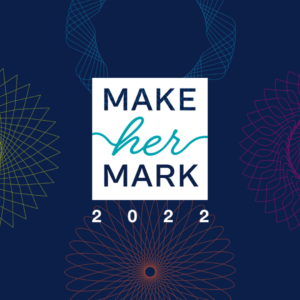
How Can Children Affect the STEM Workforce?
When we look at the importance of a STEM-based curriculum, the U.S. Department of Education states, “If we want a nation where our future leaders, neighbors, and workers can understand and solve the complex challenges of today and tomorrow, and meet the demands of the dynamic and evolving workforce, building students’ skills, content knowledge, and literacy in STEM fields is essential.” In other words, educating children will correlate to future leaders in STEM.
When Should STEM Education Start?
Studies show that starting a STEM curriculum at an early age is beneficial. When children are young, they are curious, confident, and eager to learn. STEM instruction uses hands-on experiential learning, which is ideal for young learners. Rather than simply giving students a math worksheet and correcting answers, STEM education would bring students out to the garden to count the number of plants and then discuss the parts of that plant. This allows the student to draw conclusions, problem solve, and develop critical thinking skills in their early education when the foundation for learning begins.
Helping Girls Visualize Themselves as STEM Professionals
Science Club for Girls (SCFG), a WFBoston grantee partner, offers free experiential STEM programming. Participants, who are often girls from underrepresented communities, gain excitement, confidence, and literacy in the STEM subject areas while learning from women mentors. Through these programs, participants can internalize a STEM identity and envision themselves on a path to becoming STEM professionals, a powerful catalyst for future success. The organization aims to increase academic confidence through an engaging curriculum and to bolster adolescent girls’ resilience through their programs. One parent of a participant raved.
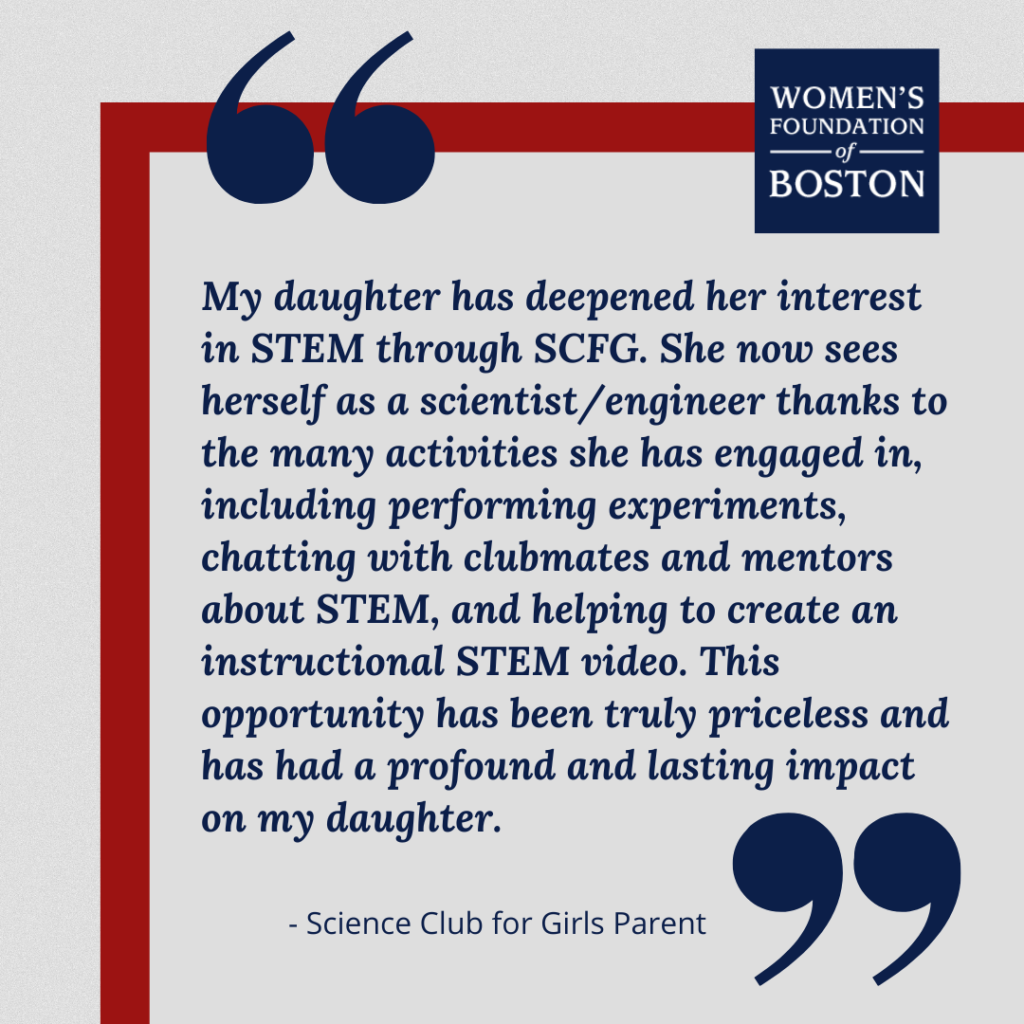
SCFG Shows Results
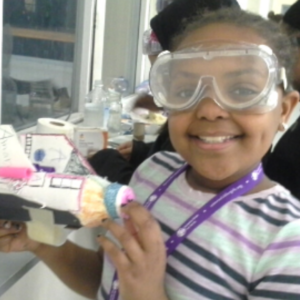
WFBoston grants have helped Science Club for Girls increase enrollment, expand programs to new locations, and reduce barriers to access by offering virtual and in-person programming. SCFG noted that girls who participated in their course work:
- 91% of participants in 8 – 12th grade reported interest in taking more challenging STEM classes in the future
- 95% like and are curious about science, and 91% believe they can do well in science and math at school
- 71% would like to have a job where they can use science
- Over the past thirteen years, >90% of SCFG Juniors and Seniors go on to college (compared to the national average of 66%), and >55% major in STEM
These statistics demonstrate the importance and impact of organizations like SCFG.
WFBoston and Make Her Mark – Investing in Girls and STEM
This fall WFBoston will highlight the importance of investing in STEM for girls at Make Her Mark. This inaugural fundraising event, fittingly taking place at the Museum of Science Boston, will feature:
- The Power of Women and Girls with STEM: An engaging panel discussion moderated by Linda Henry, CEO of the Boston Globe, featuring Laurie Glimcher, MD, President and CEO of the Dana-Farber Cancer Institute; and Paula Johnson, MD, MPH, President of Wellesley College.
- A silent auction featuring exclusive curated travel packages
- An opportunity to make YOUR mark via our Fund a Need with Bekah Salwasser, Executive Director of the Red Sox Foundation, Executive Vice President, Social Impact for the Boston Red Sox
- Elegant cuisine from MAX Ultimate Food
- Open bar with classic and contemporary cocktails
How Can You Make Your Mark?
Empower future female STEM leaders by joining WFBoston at the 2022 Make Her Mark event. 100% of all funds raised will go directly to STEM programming. Visit the event website to learn more, purchase tickets, and donate. Check out the pre-event auction for another way to support Make Her Mark. Bidding on the amazing local experiences begins on October 1, 2022. Be a part of this inspirational event and make YOUR mark for women and girls!

 Laurie H. Glimcher, MD, was named President and CEO of the Dana-Farber Cancer Institute in 2016. She is also Director of the Dana-Farber/Harvard Cancer Center and the Richard and Susan Smith Professor of Medicine at Harvard Medical School. Previously, she was the Stephen and Suzanne Weiss Dean and Professor of Medicine of Weill Cornell Medicine and Provost for Medical Affairs of Cornell University. Dr. Glimcher is a distinguished immunologist, widely renowned for her work in one of the most promising areas of cancer research.
Laurie H. Glimcher, MD, was named President and CEO of the Dana-Farber Cancer Institute in 2016. She is also Director of the Dana-Farber/Harvard Cancer Center and the Richard and Susan Smith Professor of Medicine at Harvard Medical School. Previously, she was the Stephen and Suzanne Weiss Dean and Professor of Medicine of Weill Cornell Medicine and Provost for Medical Affairs of Cornell University. Dr. Glimcher is a distinguished immunologist, widely renowned for her work in one of the most promising areas of cancer research.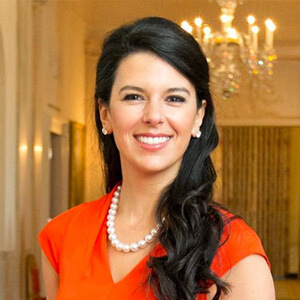 Linda Henry is the CEO of the Boston Globe Media Partners. She is a co-founder of HUBweek, a civic collaboration between the Boston Globe, Harvard University, Massachusetts General Hospital, and MIT that explores the future being built at the intersection of art, science and technology. Linda is also an early-stage impact investor, an Emmy-Award winning television producer with two shows currently airing, and a community activist. She serves as a director of the Red Sox Foundation, is a trustee of the Liverpool Football Club Foundation, chair of the Boston Globe Foundation, and chairman of the John W. Henry Family Foundation. In addition, she is a founder of the Boston Public Market, serves on the advisory board of MassChallenge, and is on the board of the Engine at MIT. She earned a BS from Babson College and her MS from MIT.
Linda Henry is the CEO of the Boston Globe Media Partners. She is a co-founder of HUBweek, a civic collaboration between the Boston Globe, Harvard University, Massachusetts General Hospital, and MIT that explores the future being built at the intersection of art, science and technology. Linda is also an early-stage impact investor, an Emmy-Award winning television producer with two shows currently airing, and a community activist. She serves as a director of the Red Sox Foundation, is a trustee of the Liverpool Football Club Foundation, chair of the Boston Globe Foundation, and chairman of the John W. Henry Family Foundation. In addition, she is a founder of the Boston Public Market, serves on the advisory board of MassChallenge, and is on the board of the Engine at MIT. She earned a BS from Babson College and her MS from MIT.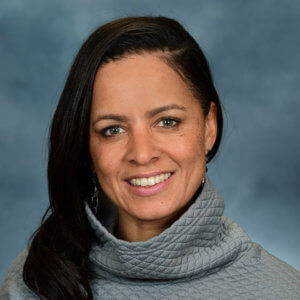 Bekah Salwasser joined the Red Sox Foundation as the Executive Director in January of 2018. She earned her B.A. in Psychology from Brown University and has extensive experience in philanthropy and both professional and semi-professional sports. After four years working as Community Relations Director for the Boston Celtics, Bekah went on to lead Scholar Athletes as its Executive Director, a program that supports public high school athletes with both their athletic and academic achievements. Earlier in her career, Bekah served as a professional soccer player for the Boston Breakers and as Executive Director of the Charlestown Lacrosse and Learning Center.
Bekah Salwasser joined the Red Sox Foundation as the Executive Director in January of 2018. She earned her B.A. in Psychology from Brown University and has extensive experience in philanthropy and both professional and semi-professional sports. After four years working as Community Relations Director for the Boston Celtics, Bekah went on to lead Scholar Athletes as its Executive Director, a program that supports public high school athletes with both their athletic and academic achievements. Earlier in her career, Bekah served as a professional soccer player for the Boston Breakers and as Executive Director of the Charlestown Lacrosse and Learning Center. Kimberly Fay Boucher is a business executive who has driven high performance organizations in technology, consumer products and social enterprise/nonprofit industries over the past 25 years. She is currently the Technology Commercialization Business Leader for the CTO at Analog Devices, where she is responsible for driving new technologies from incubation stages to successful businesses. Kim is also a Senior Lecturer at the MIT Sloan School of Management, where she teaches Disciplined Entrepreneurship in the Martin Trust Center. She holds a BS in Management Industrial Engineering from Worcester Polytechnic Institute and an MBA from Harvard Business School. She is a NCAA Academic All-American Women’s Basketball player and has been inducted into the WPI Hall of Fame.
Kimberly Fay Boucher is a business executive who has driven high performance organizations in technology, consumer products and social enterprise/nonprofit industries over the past 25 years. She is currently the Technology Commercialization Business Leader for the CTO at Analog Devices, where she is responsible for driving new technologies from incubation stages to successful businesses. Kim is also a Senior Lecturer at the MIT Sloan School of Management, where she teaches Disciplined Entrepreneurship in the Martin Trust Center. She holds a BS in Management Industrial Engineering from Worcester Polytechnic Institute and an MBA from Harvard Business School. She is a NCAA Academic All-American Women’s Basketball player and has been inducted into the WPI Hall of Fame. Ami Kuan Danoff (Co-Founder and CFO) is a private investor and the trustee of a foundation. She is a Harvard Quantum Founder and a member of the Harvard FAS Dean’s Council. Ami earned a bachelor’s degree from Harvard University in Visual and Environmental Studies and holds a dual master’s degree in Applied Economics and International Finance from the Sloan School of Management at MIT. She was a portfolio manager in global equities at Putnam Investments and co-manager of the Putnam International New Opportunities Fund, and also worked as an international equities analyst at Fidelity Investments.
Ami Kuan Danoff (Co-Founder and CFO) is a private investor and the trustee of a foundation. She is a Harvard Quantum Founder and a member of the Harvard FAS Dean’s Council. Ami earned a bachelor’s degree from Harvard University in Visual and Environmental Studies and holds a dual master’s degree in Applied Economics and International Finance from the Sloan School of Management at MIT. She was a portfolio manager in global equities at Putnam Investments and co-manager of the Putnam International New Opportunities Fund, and also worked as an international equities analyst at Fidelity Investments. Christina Heenan Suh holds an MBA from Harvard Business School, a bachelor’s degree from the University of Pennsylvania in English and Marketing and a master’s from Columbia University. A former management consultant, her work focused on strategy and implementation projects for Fortune 100 clients. She was also an account executive at Hill+Knowlton (WPP) marketing consumer packaged goods. As an Executive Board Member of the Brookline Education Foundation, which funds professional development in the Brookline Public Schools, Christina led their Grant and Oversight Committees. She currently sits on the board of the Brookline Library Foundation and teaches ESL at Rosie’s Place in Boston.
Christina Heenan Suh holds an MBA from Harvard Business School, a bachelor’s degree from the University of Pennsylvania in English and Marketing and a master’s from Columbia University. A former management consultant, her work focused on strategy and implementation projects for Fortune 100 clients. She was also an account executive at Hill+Knowlton (WPP) marketing consumer packaged goods. As an Executive Board Member of the Brookline Education Foundation, which funds professional development in the Brookline Public Schools, Christina led their Grant and Oversight Committees. She currently sits on the board of the Brookline Library Foundation and teaches ESL at Rosie’s Place in Boston. Christina Gordon (Co-Founder and CEO) holds a dual master’s degree in International Finance and Applied Economics from MIT’s Sloan School of Management. She earned her bachelor’s degree from Boston University and also studied for a joint master’s degree in Women’s Studies and Sociology at Brandeis with a focus on women in the workplace. Christina is a former assistant fund manager and technology industry equity analyst at Wellington Management. She also worked as a stock analyst at Fidelity Investments. She is a trustee of a private foundation, a member of Women Moving Millions and currently sits on the board of Rosie’s Place, a sanctuary for poor and homeless women in Boston.
Christina Gordon (Co-Founder and CEO) holds a dual master’s degree in International Finance and Applied Economics from MIT’s Sloan School of Management. She earned her bachelor’s degree from Boston University and also studied for a joint master’s degree in Women’s Studies and Sociology at Brandeis with a focus on women in the workplace. Christina is a former assistant fund manager and technology industry equity analyst at Wellington Management. She also worked as a stock analyst at Fidelity Investments. She is a trustee of a private foundation, a member of Women Moving Millions and currently sits on the board of Rosie’s Place, a sanctuary for poor and homeless women in Boston.